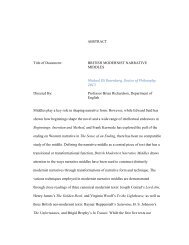- Page 1: ABSTRACT Title of dissertation: MAJ
- Page 5 and 6: Acknowledgments First and foremost,
- Page 7 and 8: Table of Contents List of Figures L
- Page 9 and 10: List of Figures 1.1 Braiding of Maj
- Page 11 and 12: Chapter 1 Introduction The subject
- Page 13 and 14: closed throughout the path. If one
- Page 15 and 16: its original configuration, we requ
- Page 17 and 18: mathematics. It is easy to check th
- Page 19 and 20: Here τ x is the Pauli matrix actin
- Page 21 and 22: y constructing the ground state pro
- Page 23 and 24: here and leaves its proof to Append
- Page 25 and 26: the zero mode (see Chapter 3 for de
- Page 27 and 28: In the case of Ising anyons, 2N vor
- Page 29 and 30: find a realistic material in nature
- Page 31 and 32: states near the Fermi circle. We fi
- Page 33 and 34: pairing: ( ) p H = ψ † 2 2m −
- Page 35 and 36: dimensional non-chiral Majorana mod
- Page 37 and 38: is formed out of two fermions, does
- Page 39 and 40: gapless and should not be neglected
- Page 41 and 42: zero modes. We study a one-dimensio
- Page 43 and 44: of possible paired states which is
- Page 45 and 46: where d ≡ (d 1 , d 2 , d 3 ) = (R
- Page 47 and 48: If the order parameter is proportio
- Page 49 and 50: 0.015 T/t 0.01 Normal p x + ip y 0.
- Page 51 and 52: trivial p x - and p y -states lead
- Page 53 and 54:
with the gap operator being ˆ∆ =
- Page 55 and 56:
0.2 T/t 0.1 Normal f p x + ip y µ
- Page 57 and 58:
2.3 Discussion and Conclusions In c
- Page 59 and 60:
Chapter 3 Majorana Bound States in
- Page 61 and 62:
satisfied for m = 0. The singlevalu
- Page 63 and 64:
We summarize this section by provid
- Page 65 and 66:
Here γ a and Γ a are 4 × 4 Dirac
- Page 67 and 68:
with λ = µξ/v. It has the follow
- Page 69 and 70:
where n = (R∆, −I∆) field des
- Page 71 and 72:
Chapter 4 Topological Degeneracy Sp
- Page 73 and 74:
ound states are usually splitted an
- Page 75 and 76:
sponding quasiparticle operator can
- Page 77 and 78:
Of particular importance is the sig
- Page 79 and 80:
[61]. Although analytical expressio
- Page 81 and 82:
eyond perturbation theory and the r
- Page 83 and 84:
eaks down in this regime and one sh
- Page 85 and 86:
4.3 Conclusions In this chapter, we
- Page 87 and 88:
the fermion bath, and consequently
- Page 89 and 90:
tion for the reduced density matrix
- Page 91 and 92:
like phonons. However, such process
- Page 93 and 94:
We also notice that in this formula
- Page 95 and 96:
etween two topological p x + ip y s
- Page 97 and 98:
neglect the AC phase. The Hamiltoni
- Page 99 and 100:
which in principle lead to a strong
- Page 101 and 102:
We conclude that the geometric phas
- Page 103 and 104:
The first-order term vanishes due t
- Page 105 and 106:
apply to any realistic system where
- Page 107 and 108:
ound states are typically close to
- Page 109 and 110:
Chapter 6 Non-adiabaticity in the B
- Page 111 and 112:
minor modifications in the details,
- Page 113 and 114:
{α(T )} to {α(0)}: |α(T )〉 =
- Page 115 and 116:
educed to 2 N−1 by fermion parity
- Page 117 and 118:
Berry connection of this state then
- Page 119 and 120:
wavefunction is u n (r), v n (r). W
- Page 121 and 122:
asis. The most general form of BdG
- Page 123 and 124:
6.2.1 Effect of Tunneling Splitting
- Page 125 and 126:
Because E + ∼ ∆ 0 e −R/ξ , |
- Page 127 and 128:
tunneling amplitudes between them a
- Page 129 and 130:
ˆΓ i = iˆγ i ˆξiˆη i , i =
- Page 131 and 132:
considerations, we should have β 1
- Page 133 and 134:
states: ν(ε) = 2ν 0 ε √ ε2
- Page 135 and 136:
necessary as a matter of principle
- Page 137 and 138:
Chapter 7 Majorana Zero Modes Beyon
- Page 139 and 140:
We then demonstrate that in a finit
- Page 141 and 142:
The standard Abelian bosonization r
- Page 143 and 144:
and define the chiral fields by ˜
- Page 145 and 146:
of (7.2) has a product of the Klein
- Page 147 and 148:
7.3 Stability of the Degeneracy We
- Page 149 and 150:
quence. The splitting is then propo
- Page 151 and 152:
where α = 1 2 (K + K−1 − 2). A
- Page 153 and 154:
effect of quasiparticle tunneling o
- Page 155 and 156:
Appendix A Derivation of the Pfaffi
- Page 157 and 158:
which allows further simplification
- Page 159 and 160:
List of Publications Publications t
- Page 161 and 162:
Bibliography [1] K. von Klitzing, G
- Page 163 and 164:
[46] S. Das Sarma, C. Nayak, and S.
- Page 165 and 166:
[92] A. W. W. Ludwig, D. Poilblanc,
- Page 167 and 168:
[133] M. V. Berry, Proc. R. Soc. Lo
















